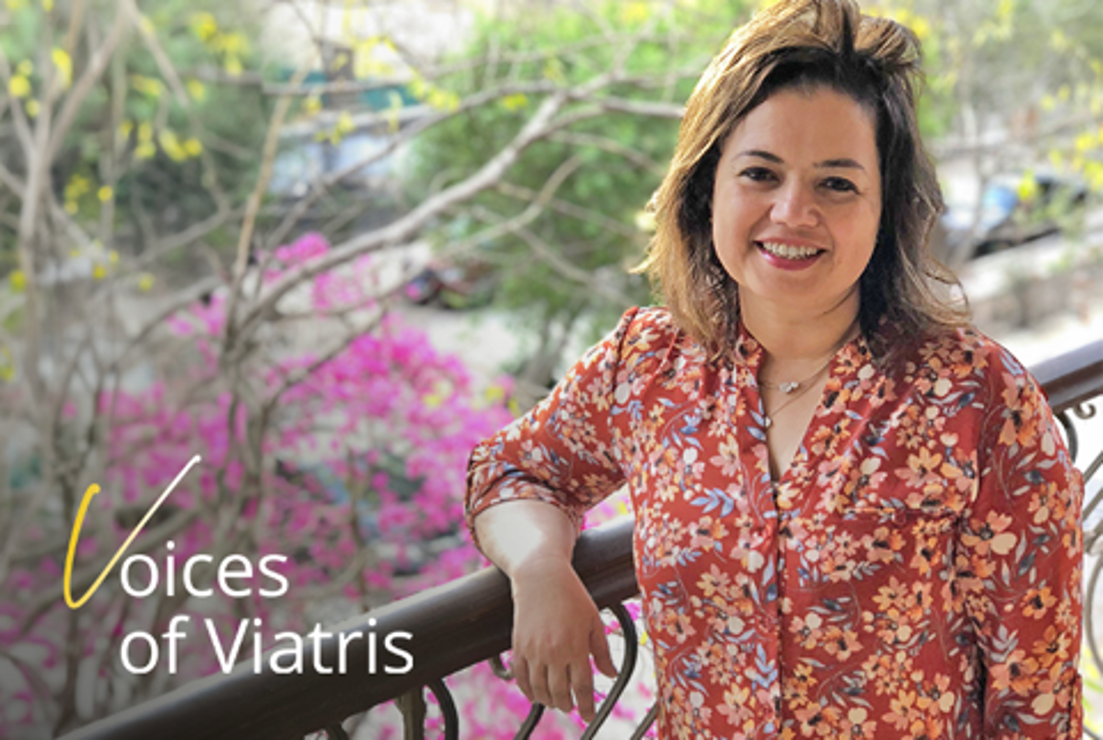Show Menu
Choose Your Location
You are now leaving the Viatris page for a Viatris affiliate site or third party site that is solely responsible for its content, including its compliance with guidelines applicable in certain geographies. Links to Viatris affiliate sites and third party sites are provided as a resource to our visitors and may not be governed by the same regulatory requirements applicable to this site and unaffiliated third party sites are subject to their own terms and data protection notices and practices. Moreover, if their third party site is subject to other country laws, regulatory requirements, data protection requirements or medical practices may differ between countries and the information provided therein may not be suitable for use in your country.

Voices of Viatris
By: Niki Kapsambelis
March 11, 2024
Looking back on a career that has taken her around the world, Lobna Salem can see all the points where her journey took unexpected turns, moving her out of her comfort zone and – at times – far from her home.
Each moment brought its own brand of vulnerability, required its own kind of courage. But the constant -- the red thread that connects her current role as Viatris’ Head of Medical Affairs for Developed Markets back to her childhood in Egypt -- is science.
“There’s no recipe for journeys,” said Lobna. “Cling to your sense of purpose, and you’ll never go wrong.”
A physician by training, she grew up in a middle-class family of engineers; her father built theaters and plazas.
“Education meant a lot for us. And that’s, I would say, a hallmark of a middle-class family; you excel by being more educated,” she said.
Seeing the respect that her father’s work commanded, Lobna viewed science, technology, engineering and math (STEM) subjects as a path to success. She pursued her interest in biology, which she expressed as a little girl by pretending to be a doctor, listening to people’s hearts with a toy stethoscope. But she might just as easily have pursued her other loves: acting and singing.
To this day, she can still recite lines from Shakespeare, easily recalling a speech by Antony from “Julius Caesar.” She can slip into the role of the Artful Dodger from “Oliver Twist.”
“I think acting gives you another perspective,” said Lobna – but, ever the scientist, she hypothesizes that her interest in theater is genetic, since her father also studied drama.
As a physician, she practiced for several years at the National Cancer Institute in Cairo, Egypt, an experience she carries with her still.
“I watched first hand the patients’ suffering, and not only the patients, but also their caregivers, their families. I formed very strong bonds,” she said. “It’s the one-on-one with the patient, but you also become part of their life. And it’s very humbling to feel that you make a difference, a real difference, in those people’s lives.”
One of her major career pivots was the moment she decided to move into the pharmaceutical industry, first working at the same institute where she had practiced medicine, then later taking a job that brought her to New York.
“I moved to the United States to have a broader impact, not only locally as I was in Egypt, but also from a global perspective,” she said. Her daughters were young at the time, and the idea of moving to a new country was intimidating, but she felt the new job would offer the opportunity to help more people. She took roles of increasing responsibility, covering North America, Europe, China, Japan, Latin America and Emerging Markets.
Learn more about Lobna’s decision to work in pharma.
In her current role with Medical Affairs, she feels a deep sense of purpose from serving patients: “Medical affairs is at the forefront of scientific advancement, of scientific knowledge, and really has this deep understanding of patients’ needs and has the ability to bring forward solutions to bridge the gaps to address those needs,” she said.
Click here to watch Lobna explain the role Medical Affairs plays in Viatris.
Always, her thoughts return to the cancer patients she once cared for as a doctor.
“I made them feel happier. I made a difference in their lives,” Lobna said. “Maybe I’m not the only factor … but at least I gave them something, and I felt it.”
Today, her daughters have grown, and each has followed her into a science-based career; one as an engineer, the other as an architect.
“I think the world has changed,” Lobna said, noting that more women continue to work in STEM roles now that in previous generations.
Hear Lobna’s thoughts on expressing vulnerability as a leader.
“I think the new generation, in general, have a lot of opportunities that maybe we didn’t have,” she said. “There’s still a fight. But I think the most important battle they need to win is that they need to ground themselves in their purpose, build a support system, accept their authentic self, and they need to bring this authentic self to what they do every day.”